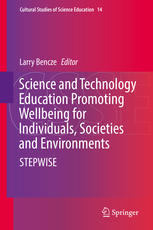

Most ebook files are in PDF format, so you can easily read them using various software such as Foxit Reader or directly on the Google Chrome browser.
Some ebook files are released by publishers in other formats such as .awz, .mobi, .epub, .fb2, etc. You may need to install specific software to read these formats on mobile/PC, such as Calibre.
Please read the tutorial at this link: https://ebookbell.com/faq
We offer FREE conversion to the popular formats you request; however, this may take some time. Therefore, right after payment, please email us, and we will try to provide the service as quickly as possible.
For some exceptional file formats or broken links (if any), please refrain from opening any disputes. Instead, email us first, and we will try to assist within a maximum of 6 hours.
EbookBell Team

4.3
38 reviewsThis edited volume provides theoretical and practical resources relating to the ‘STEPWISE’ curricular and instructional framework. ‘STEPWISE’ is the acronym for Science & Technology Education Promoting Wellbeing for Individuals, Societies & Environments. It is a framework for organizing teaching and learning domains in ways that prioritize personal and social actions to address ‘critical socioscientific issues’ — that is, controversial decisions by powerful individuals/groups about science and technology (and related fields) that may adversely affect individuals, societies and/or environments. The book contains chapters written by and/or with teachers who have used STEPWISE to guide their instructional practices, as well as chapters written by education scholars who have used a range of theoretical lenses to analyze and evaluate STEPWISE — and, in several cases, described ways in which it relates to (or could relate to) their practices and/or ways in which the framework might logically be amended. Overall, this book offers educators, policy makers and others with resources useful for arranging science and technology education in ways that may assist societies in addressing significant potential personal, social and/or environmental problems — such as dramatic climate change, preventable human diseases, species losses, and social injustices — associated with fields of science and technology.